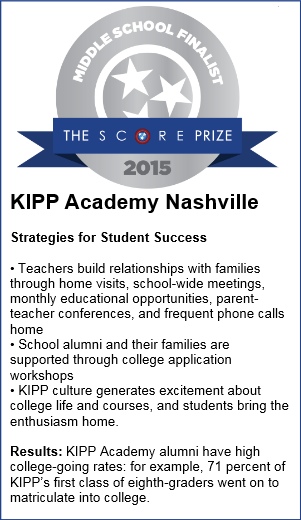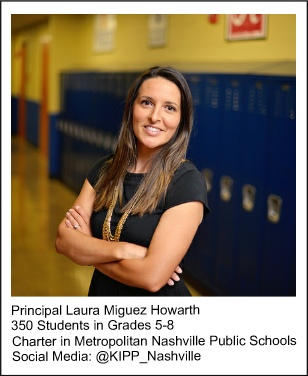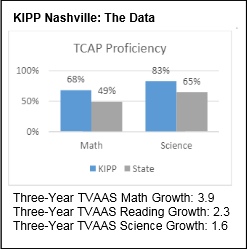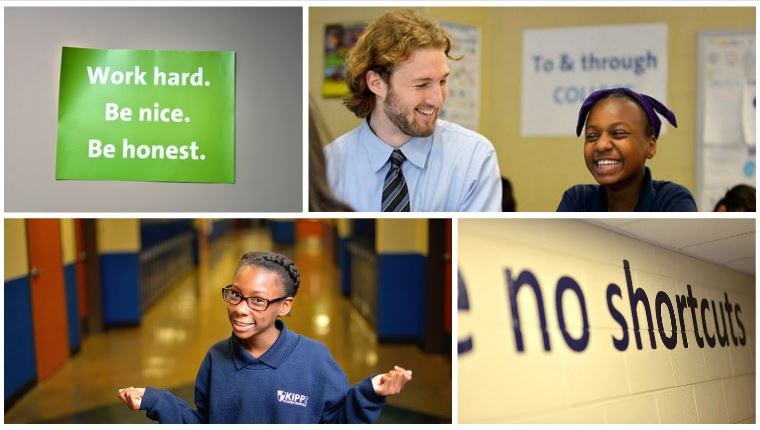Text messages. Emails. Fliers in the mail. Saturday meetings at coffee shops.
When it comes to keeping lines of communication open with parents, 2015 SCORE Prize finalist KIPP Academy Nashville puts every possible channel to use, according to parent Debra Payne.
“Their ability to be available is constant. The ability of them to be approachable and there for you is infinite, and sincere. And that is the difference,” said Ms. Payne. “There is nothing that compares.”
At KIPP Academy, which was also a SCORE Prize middle school finalist in 2014, staff believe that strong relationships between parents, kids and teachers lead to fundamentally transformed outcomes. Families are deeply engaged from the very beginning of kids’ work at KIPP. And college conversations happen early and often at this public charter school, which serves 350 students in grades 5-8 within Metro Nashville Public Schools. KIPP Academy is part of a national network of charter schools. In Nashville, KIPP schools have been established that will ultimately serve students in grades kindergarten through 12.
For Ms. Payne, KIPP exemplifies “compassion and old-school educational values.” The family’s strong educational priorities brought them to KIPP after trying numerous other options, both public and private. The discipline and academic focus of KIPP, combined with the constant availability of staff members, proved to be a winning combination for Ms. Payne and her daughter, Lexi. Now Lexi is a KIPP Academy alum attending a Metro Nashville high school, but relationships with KIPP staff remain significant.
“There are so many people there that I just love. They are literally part of my family now,” said Ms. Payne. “I just cannot ever thank them enough.”
At KIPP Academy, relationships between school staff and families begin with home visits. After students are accepted to the school but before the academic year begins, KIPP teachers travel in pairs to visit homes and work through a questionnaire about family strengths, struggles, and free time. Responses are shared with the rest of the KIPP team.
Teachers make it clear on the visits that KIPP staff care about each child as a person and will treat kids in their care the same way they’re treated at home. Discussion of parents’ hopes and dreams, as well as concerns about school, help establish collaboration and trust. Expectations about homework are communicated, so parents know they’ll need to plan for 30-60 minutes each night as well as a space to accommodate their child’s work.
Part of KIPP’s work can be repairing previous damage, said Laura Howarth, KIPP Academy’s School Leader. Like every school, some KIPP parents didn’t graduate from high school and may not have found education to be a positive experience.
“We meet them where they’re most comfortable,” said Ms. Howarth. “I think our work is to make sure their child has the most positive experience possible. Through that, many parents get a different mindset about what that experience can be like.”
 In the first weeks of each school year, a meeting for families introduces teachers, shares the content and scope of curriculum for the year, clearly communicates school expectations, and provides information about how to support kids at home. Then, throughout the year, KIPP maintains close contact with all families through a variety of channels. Phone calls home are made as frequently as possible, regarding both struggles and successes. KIPP also builds time for more parent-teacher conferences than the district requires, meeting with parents at the end of each of the first three quarters.
In the first weeks of each school year, a meeting for families introduces teachers, shares the content and scope of curriculum for the year, clearly communicates school expectations, and provides information about how to support kids at home. Then, throughout the year, KIPP maintains close contact with all families through a variety of channels. Phone calls home are made as frequently as possible, regarding both struggles and successes. KIPP also builds time for more parent-teacher conferences than the district requires, meeting with parents at the end of each of the first three quarters.
“The more we can meet with families to let them know what expectations they can ask of their kids, the better chance they have of kids meeting that,” said Ms. Howarth. “Some kids are intrinsically driven. But I was one of those kids who pretty much jumped as high as the bar you set for me. A lot of kids are like that.”
KIPP generates continual excitement for college through the school’s programming and culture, effectively turning kids into vehicles for communicating college enthusiasm, said Ms. Howarth. Middle school days are filled with discussion of degree programs, course offerings, and college life. It is always made clear to students exactly what options are possible with specific grade-point averages and test scores.
Concrete planning begins while students are in middle school at KIPP Academy. A Parent Involvement Committee meets monthly, providing information on topics ranging from supporting students’ coursework to saving for college and establishing 529 savings plans. The meetings include fellowship time for snacks with teachers and other families.
And once students complete their work at KIPP Academy, they still have access to incredible college preparation resources. A program called KIPP Through College (KTC) guides families through high school planning, college applications, and financial aid.
Emily Blatter, KTC director, said KIPP doesn’t think in terms of working to engage parents in college planning. In fact, it’s just the opposite.
“It’s not that we have to get parents to be a part of the process. They’re already a fundamental part,” said Ms. Blatter. “They want their kids to go to the best colleges. They want them to have life-changing opportunities. They don’t need to be convinced of that at all.”
Through KTC, KIPP Academy alumni are helped to overcome the hurdles. Workshops are hosted for students and families, and relationships started at KIPP Academy are maintained for years after. Kids get help identifying college options, including schools that might be more selective or farther from home than students might aim for on their own. Applying for the U.S. Department of Education’s Free Application for Federal Student Aid (FAFSA) program as well as other sources of financial aid is complex, requiring significant documentation.
“We want parents to get in the know as much as their students are. We don’t want students to be the only ones carrying the knowledge, because at the end of the day, the parent will make the decision,” Ms. Blatter said. “It’s really about information, direction, and demystifying.”
Ms. Payne and her daughter Lexi have taken full advantage of KTC’s resources in the years after Lexi finished her time at KIPP Academy. Lexi, a talented visual artist and honors student, has applied to schools including the Maryland Institute College of Art and the Rhode Island School of Design. Her family is currently going through the process of figuring out financing with scholarships and grants.
While the family has gone through the application process before with an older sibling, things are different now. Everything is online, for one thing, and there are many deadlines and details to be aware of. KTC utilizes the same open channels of communication in play at KIPP Academy. Program staff help families tackle barriers large and small, from making use of a KTC printer to coordinating transportation for campus tours. Between the workshops, phone calls, meetings, and mailings, Ms. Payne said KIPP families have an advantage.
“These folks are thoroughly knowledgeable about what to do, when to apply. Had we not had them, I am positive we would have missed imperative deadlines,” said Ms. Payne. “I wish this were available to all students.”
To learn more about KIPP Academy’s work for student achievement, watch this video:

